Your Kodak moments
- Published
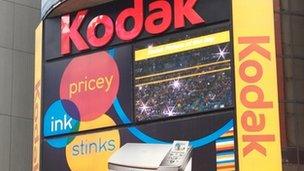
Kodak signs at Times Square, Manhattan
Eastman Kodak, the company that invented the hand-held camera, has filed for bankruptcy protection.
For 133 years the brand has been synonymous with the art of image making for many loyal users of their camera equipment and processing chemicals and stock.
BBC News website readers share their memories of working and playing with Kodak.
Alan MacKenzie, Brighton, UK
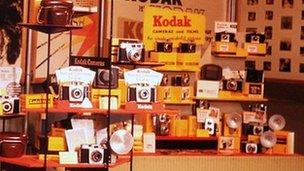
Alan Mackenzie's photo of a Kodak display in Boots, Brighton in 1960
Alan is a keen photographer who worked in photographic departments.
"I was a 'photography nut' from a very early age and was given my first Brownie 127 at the age of about nine or ten.
From then on it was 'downhill' all the way and I dread to think how much I have spent on this indulgence over the years and at 68 years old I still can't stop!
I started my working life in the photographic department of Boots in Western Road Brighton. My photograph here was taken around 1960 on the top floor when we held a special 'Photo Week'.
From Boots I became a manager of an independant photo retailer and then manager of photo wholesaler 'Jonathan Fallowfield' who at that time were the only independant distributer in the UK to be able to distribute Kodak film.
Sadly, I have seen the gradual demise of this great company and just hope that they can get things together - we don't want to lose them!"
Keith Hawkins, Merseyside, UK
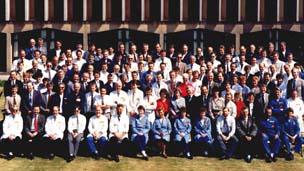
The Kodak team on the site of their works in Kirby
Keith worked at Kodak Eastman in Kirby
"I worked on the Kodak Eastman site from 1974 until 2008. When Kodak moved on from that location, I found lots of photographs. The image here is part of the Kodak team (some were not there because of shift work) gathered for the 40th anniversary of the company working on the site in Kirby.
I felt sad today hearing the news about Kodak. In the 70's, Kodak was a household name, like Tesco is today. Back then in the US, when a camera was referred to, people called it a Kodak, a bit like the way some people still say Hoover for vaccuum cleaner.
I enjoyed working for Eastman. It was a great employer."
Robert Hutton, Windsor, UK
Robert worked for Kodak in Harrow for five years from 1995-2000.
"They were a great employer. A large company, but with a family feel to it. Everyone felt valued and supported.
I still have fond memories and many friends from my time there. They had superb operational practices and manufacturing excellence, but you sensed they were internally focussed.
In the late-90's whilst Sony, Panasonic, etc. were producing the first hand-held digital cameras I was working on the launch of Kodak's new colour reversal film. It just felt a bit like we were King Canute trying to hold back the digital tide."
Adam Stockwell, Leeds, UK
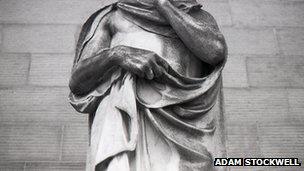
Adam takes his black and white images with Kodak stock
Adam is a photographer whose black and white images are mainly taken with Kodak film.
"My earliest memories consist of being given pointers on where to take family photos at places like Chessington World of Adventures with signs stating "The Kodak Moment".
This is a really sad day for photography, Kodak really were the pioneers of affordable photography.
I think short of their involvement, we would still see photography as a professional trade rather something accessible by all. The Kodak boxed brownie brought photography to the hands of everyone. It is upsetting to see them fall away, especially as someone who still uses film."
Chris, Garstang, UK
Chris followed his passion for photography through university into his working life.
"I became very interested in photography in my teenage years, taking countless slides with Kodak and also black and white photos using Ilford.
At Cambridge University I ran the photographic society with my good friend Peter, later to be my best man.
After Cambridge Peter and I carried on with our passion, I joined Ilford in marketing and Peter joined Kodak in Hemel Hempstead, just by the infamous magic roundabout.
In 1979 Ilford Ltd celebrated 100 years as a company but in 1980 an American, Nelson Bunker-Hunt, caused the price of silver to skyrocket, from around $2 to $20 a troy ounce. This had a disastrous effect on Ilford and they closed down half the product lines and consequently half the work force, myself included.
Kodak survived as I believe Eastman Kodak had major silver mines and reserves. Ilford has actually managed to survive by sticking to its core strength of producing black and white film and photo paper products. Kodak had the chance and opportunity to reinvent itself just like Apple but clearly has missed out. A big shame but a lesson for all organisations."
Toby Deveson, London
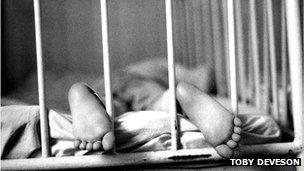
Toby Deveson's image from an orphanage in Romania in 1991, developed with Kodak chemicals
Toby is a professional photographer and cameraman who has travelled the world taking images and showing his work in exhibitions.
"I have been a photographer for over 20 years and have remained analogue throughout. I believe passionaltely in the beauty and power of film photography.
I have used Kodak Film and chemicals from day one. It has become a part of me and my voice and I would be at a loss without it.
Kodak and it's film products are a part of our heritage and in particular, as far as I am concerned the hey day of black and white photography.
I have everything crossed that they will continue to produce film and chemicals, or that someone will buy that branch of the business and take it on. We are in the midst of an analogue revival in the world of photography and to lose Kodak at the last minute would be an absolute tragedy."
Peter Taylor, UK
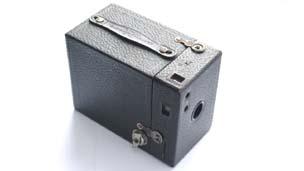
Peter Taylor's Brownie Hawkete Kodak
Peter found an older model Kodak camera and took time to make it work.
"I found a Kodak "Brownie Hawkeye model B" in a junk shop - it dates from the 1920s but still works perfectly.
Although I had to cover up the film counter safe light (which pre-dated colour film) I was able to take some pictures."
Davide Buttaci, London
"In 1981 I was seven years old and bought a Kodak 200 with my first holy communion money. I think it used 110 film cartridge and the handle would fold back over the camera as a protective case.
I bought the battery flash for it which was larger than the camera itself. Such fond memories and a sad day if Kodak goes under."